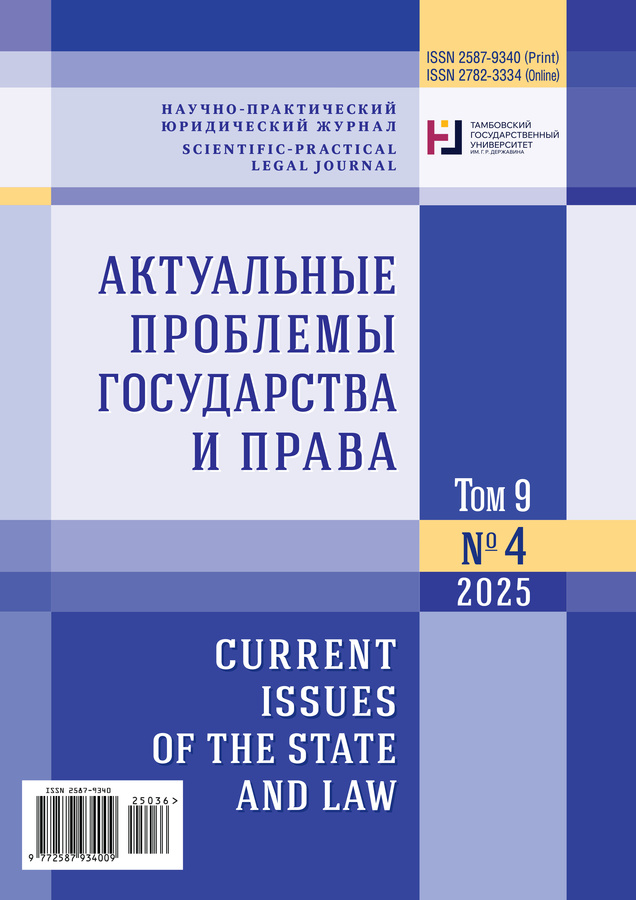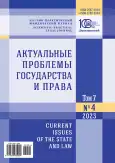Структура секундарного права
- Авторы: КРАМСКОЙ В.В.1,2
-
Учреждения:
- ФГБОУ ВО «Тамбовский государственный технический университет»
- Тамбовский филиал ФГБОУ ВО «Российская академия народного хозяйства и государственной службы при Президенте Российской Федерации»
- Выпуск: Том 7, № 4 (2023)
- Страницы: 493-503
- Раздел: Общая теория и история права и государства
- URL: https://journal-vniispk.ru/2587-9340/article/view/303621
- ID: 303621
Цитировать
Аннотация
Внутреннее строение секундарного права рассмотрено как универсальная теоретико-правовая конструкция, используемая не только в частноправовых отраслях, но и в публичном праве. При этом констатирован преобладающий в науке цивилистический подход к изучению секундарных прав, что не дает в полной мере объективной картины существа данной правовой конструкции. По лекалам структуры субъективного права на основе трудов по теории права проанализировано содержание правомочий, входящих в состав секундарного права, посредством которых реализуется заложенный в секундарное право интерес. По наблюдениям только два правомочия могут образовать конструкцию секундарного права – правомочие на свое поведение и правомочие на чужое поведение (правомочие требования). При этом для образования секундарного права в ряде случаев достаточно только одного правомочия – правомочия на свое поведение, в других – возможно сосуществование изначально двух названных правомочий в рамках одной конструкции секундарного права, либо правомочие на чужое поведение может носить вспомогательное свойство для целей реализации правомочия на свое поведение. Помимо этого приведены теоретические выкладки относительно зависимости набора правомочий в структуре секундарного права от вида правоотношения (регулятивного, охранительного, отраслевого) и изучены свойства стабильности и динамичности структуры секундарного права в условиях современной правовой действительности. По результатам исследования сформулированы выводы.
Об авторах
Вадим Владимирович КРАМСКОЙ
ФГБОУ ВО «Тамбовский государственный технический университет»; Тамбовский филиал ФГБОУ ВО «Российская академия народного хозяйства и государственной службы при Президенте Российской Федерации»
Автор, ответственный за переписку.
Email: vkramskoy@mail.ru
ORCID iD: 0000-0002-4186-7765
кандидат юридических наук, доцент кафедры гражданского права и процесса Юридического института; доцент кафедры правовых дисциплин
Россия, Российская Федерация, 392000, г. Тамбов, ул. Советская, 106/5; Российская Федерация, 392008, г. Тамбов, Моршанское ш., 14аСписок литературы
- Вормс А.Э. Вексельные бланки. М.: Типо-лит. т-ва И.Н. Кушнерев и Ко, 1914. 30 с.
- Иоффе О.С. Избранные труды по гражданскому праву: из истории цивилистической мысли. Гражданское правоотношение. Критика теории «хозяйственного права». М.: Статут, 2000. 777 с.
- Агарков М.М. Обязательство по советскому гражданскому праву // Избранные труды по гражданскому праву. М., 2002. Т. 1. 490 с.
- Третьяков С.В. Развитие учения о субъективном частном праве в зарубежной цивилистике: дис. … д-ра юрид. наук. М., 2022. 495 с.
- Tuhr A. Von. Tratado de las Obligaciones. Granada: Editorial Comares, 2007. 543 p.
- Бабаев А.Б. Проблема секундарных прав в российской цивилистике: автореф. дис. … канд. юрид. наук. М., 2006. 24 с. https://elibrary.ru/nkcjnr
- Карнушин В.Е. Секундраные права в гражданском праве Российской Федерации: общие вопросы теории, секундарные права в Гражданском кодексе РФ / под ред. В.П. Камышанского. М.: Статут, 2016. 256 с. https://elibrary.ru/wgagnn
- Гражданское право: актуальные проблемы теории и практики / под общ. ред. В.А. Белова. М.: Юрайт, 2007. 993 с. https://elibrary.ru/qxgknl
- Portmann W. Wesen und System der subjektiven Privatrechte. Zürich: Schulthess, 1996. 277 S.
- Братусь С.Н. Юридическая ответственность и законность. Очерк теории. М., 1976. 215 с. https://elibrary.ru/rahztl
- Александров Н.Г. Законность и правоотношения в советском обществе. М., 1955. 176 с.
- Матузов Н.И., Малько А.В. Теория государства и права. М., 2000. 720 с.
- Певзнер А.Г. Понятие и виды субъективных гражданских прав: дис. … канд. юрид. наук. М., 1961. 242 с. https://elibrary.ru/npquzz
- Груздев В.В. Структура субъективных гражданских прав и гражданско-правовых обязанностей // Актуальные проблемы российского права. 2018. № 5 (90). С. 95-104. https://doi.org/10.17803/1994-1471.2018.90.5.095-104, https://elibrary.ru/xsmfsh
- Теория государства и права / под ред. А.С. Пиголкина, Ю.А. Дмитриева. М., 2008. 743 с. https://elibrary.ru/vtsbzf
Дополнительные файлы









